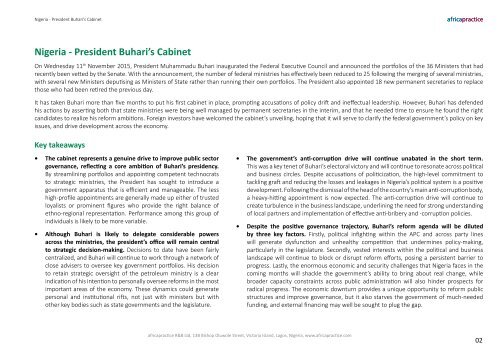africapractice
1NuZ0cR
1NuZ0cR
Create successful ePaper yourself
Turn your PDF publications into a flip-book with our unique Google optimized e-Paper software.
Nigeria - President Buhari’s Cabinet<br />
<strong>africapractice</strong><br />
Nigeria - President Buhari’s Cabinet<br />
On Wednesday 11 th November 2015, President Muhammadu Buhari inaugurated the Federal Executive Council and announced the portfolios of the 36 Ministers that had<br />
recently been vetted by the Senate. With the announcement, the number of federal ministries has effectively been reduced to 25 following the merging of several ministries,<br />
with several new Ministers deputising as Ministers of State rather than running their own portfolios. The President also appointed 18 new permanent secretaries to replace<br />
those who had been retired the previous day.<br />
It has taken Buhari more than five months to put his first cabinet in place, prompting accusations of policy drift and ineffectual leadership. However, Buhari has defended<br />
his actions by asserting both that state ministries were being well managed by permanent secretaries in the interim, and that he needed time to ensure he found the right<br />
candidates to realize his reform ambitions. Foreign investors have welcomed the cabinet’s unveiling, hoping that it will serve to clarify the federal government’s policy on key<br />
issues, and drive development across the economy.<br />
Key takeaways<br />
• The cabinet represents a genuine drive to improve public sector<br />
governance, reflecting a core ambition of Buhari’s presidency.<br />
By streamlining portfolios and appointing competent technocrats<br />
to strategic ministries, the President has sought to introduce a<br />
government apparatus that is efficient and manageable. The less<br />
high-profile appointments are generally made up either of trusted<br />
loyalists or prominent figures who provide the right balance of<br />
ethno-regional representation. Performance among this group of<br />
individuals is likely to be more variable.<br />
• Although Buhari is likely to delegate considerable powers<br />
across the ministries, the president’s office will remain central<br />
to strategic decision-making. Decisions to date have been fairly<br />
centralized, and Buhari will continue to work through a network of<br />
close advisers to oversee key government portfolios. His decision<br />
to retain strategic oversight of the petroleum ministry is a clear<br />
indication of his intention to personally oversee reforms in the most<br />
important areas of the economy. These dynamics could generate<br />
personal and institutional rifts, not just with ministers but with<br />
other key bodies such as state governments and the legislature.<br />
• The government’s anti-corruption drive will continue unabated in the short term.<br />
This was a key tenet of Buhari’s electoral victory and will continue to resonate across political<br />
and business circles. Despite accusations of politicization, the high-level commitment to<br />
tackling graft and reducing the losses and leakages in Nigeria’s political system is a positive<br />
development. Following the dismissal of the head of the country’s main anti-corruption body,<br />
a heavy-hitting appointment is now expected. The anti-corruption drive will continue to<br />
create turbulence in the business landscape, underlining the need for strong understanding<br />
of local partners and implementation of effective anti-bribery and -corruption policies.<br />
• Despite the positive governance trajectory, Buhari’s reform agenda will be diluted<br />
by three key factors. Firstly, political infighting within the APC and across party lines<br />
will generate dysfunction and unhealthy competition that undermines policy-making,<br />
particularly in the legislature. Secondly, vested interests within the political and business<br />
landscape will continue to block or disrupt reform efforts, posing a persistent barrier to<br />
progress. Lastly, the enormous economic and security challenges that Nigeria faces in the<br />
coming months will shackle the government’s ability to bring about real change, while<br />
broader capacity constraints across public administration will also hinder prospects for<br />
radical progress. The economic downturn provides a unique opportunity to reform public<br />
structures and improve governance, but it also starves the government of much-needed<br />
funding, and external financing may well be sought to plug the gap.<br />
<strong>africapractice</strong> R&B Ltd, 13B Bishop Oluwole Street, Victoria Island, Lagos, Nigeria, www.<strong>africapractice</strong>.com<br />
02



